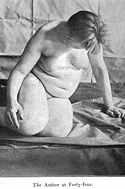Difference between revisions of "User:Jnk"
| Line 1: | Line 1: | ||
| + | {| | ||
| + | |-valign="top" | ||
| + | [[Image:Lind_44_Page_4.LOW.MED.jpg|125px]] | ||
| + | | | ||
| + | |||
| + | <h4>[[Earl Lind (Ralph Werther-Jennie June): The Riddle of the Underworld, 1921]]</h4> | ||
| + | |||
| + | Transgender Memoir of 1921 Found | ||
| + | |||
| + | |||
| + | |||
LIND | LIND | ||
His extravagant "feminine" role-playing was based upon an acceptance and extreme exaggeration of the most traditional concept of "femininity." What Kate Millett has said of the homosexual characters of Jean Genet may be applied to Earl Lind: "Because of the perfection with which they ape the 'masculine' and 'feminine' of heterosexual society, [Genet's] homosexual characters represent the best contemporary insight into its constitution and beliefs." | His extravagant "feminine" role-playing was based upon an acceptance and extreme exaggeration of the most traditional concept of "femininity." What Kate Millett has said of the homosexual characters of Jean Genet may be applied to Earl Lind: "Because of the perfection with which they ape the 'masculine' and 'feminine' of heterosexual society, [Genet's] homosexual characters represent the best contemporary insight into its constitution and beliefs." | ||
Revision as of 06:12, 8 October 2010

Earl Lind (Ralph Werther-Jennie June): The Riddle of the Underworld, 1921Transgender Memoir of 1921 Found
LIND His extravagant "feminine" role-playing was based upon an acceptance and extreme exaggeration of the most traditional concept of "femininity." What Kate Millett has said of the homosexual characters of Jean Genet may be applied to Earl Lind: "Because of the perfection with which they ape the 'masculine' and 'feminine' of heterosexual society, [Genet's] homosexual characters represent the best contemporary insight into its constitution and beliefs."
END LIND
Image:AG Union Sq.jpeg
Begins Friday, December 26th 1 AM (that’s late Thursday night) And airs Every Friday @ 1 AM through March 20, 2009 With a grant from Manhattan Neighborhood Network, the ACT UP Oral History Project has created a 9-part cable access series. Edited by James Wentzy and Jim Hubbard. The series includes programs on “Changing the CDC Definition of AIDS” and “ACT UP’s Greatest Achievements.” The ACT UP Oral History Project has been documenting the history of AIDS Activism by conducting long-format interviews of members of ACT UP. We’ve done 103 interviews so far. We are creating a vital and complex portrait of a diverse community of people who came to believe that self-empowerment, social change and direct political action could provide solutions to the AIDS crisis and investigating the history of a movement that chose civic engagement over palliative solutions and which has served as a model for increased participation in public affairs for marginalized groups in the New York City and around the world. For more information on the project go to www.actuporalhistory.org.
|
- ↑ Kate Millett, Sexual Politics (N.Y.:A von Books, Equinox Edition, 1971) p .17.
- ↑ Vita Sackville-West's diary of 1920-21 records both her cross-dressing and her Lesbian relations with Violet Trefusis and others-readily lending itself to a feminist interpretation (Nigel Nicholson, Portrait of a Marriage [N.Y.: Bantam, 1973], p. II, 107-08, III, 114-16, 121, 141, 154, 164-65, 177). A scrapbook, apparently kept by a Lesbian in the 19205 and 1930s, is in the collection of the Institute for Sex Research, Bloomington, Ind. It includes numbers of newspaper clippings concerning women wearing pants and reported episodes of transvestism.